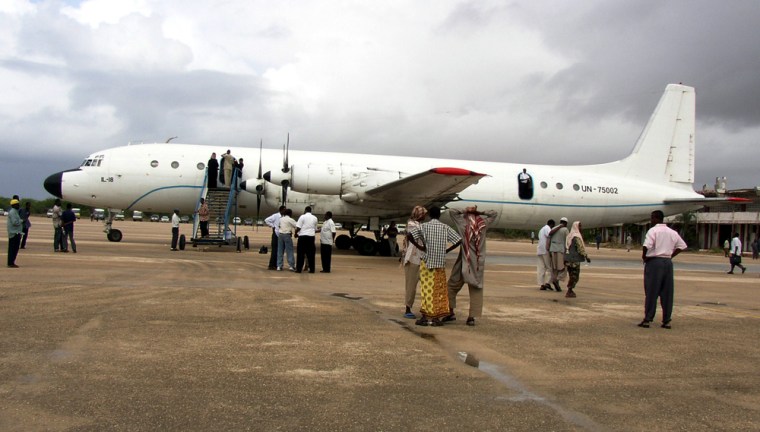Somali leaders struggled to regroup Wednesday after a week in which 29 ministers quit the government, with the defectors urging the virtually powerless administration to reconcile with Islamic militants who have seized the capital.
Eleven ministers stepped down Tuesday and Wednesday, adding to the 18 who resigned late last week.
For the time being, Prime Minister Ali Mohamed Gedi’s government is secure, because he has the support of more than half the 42 remaining ministers. Of those who resigned only 11 were full ministers; the rest were deputy ministers.
Yet his already weak government — isolated by the success of the hard-line Supreme Islamic Courts Union — has been further incapacitated by the resignations. In previous months, five other ministers quit or were fired, though for reasons unrelated to the current crisis.
“The prime minister has failed to talk to the Islamic Union,” said Hasaan Abshir Farah, who quit late Tuesday.
The group’s leader, Sheikh Hassan Dahir Aweys, said in a radio broadcast that the former ministers were welcome in his group.
Others also urged the government to at least form contacts with the Islamic group, whose militia seized most of southern Somalia including the capital, Mogadishu. The U.N.-installed transitional government is located in Baidoa, one of the only places in the south not in the Islamic group’s control.
U.N. official: Security better — but
In Mogadishu, the U.N. humanitarian coordinator for Somalia, Eric Larouche, told journalists that the Somali capital’s security had improved, but “there can be no full security unless there is dialogue between all sides in Mogadishu.”
Larouche spoke after he and nine other U.N. officials met with top officials of the Islamic group. He said the United Nations wanted to help people displaced by months of fighting in Mogadishu, including providing tents for children to study under when school starts in September.
Abdirahman Janaqaw, the deputy leader of the Islamic courts’ executive council, said the U.N. is welcome to reopen its offices in Mogadishu but did not say whether any agreement had been reached.
Somalia’s government was formed two years ago with the support of the United Nations to help the Horn of Africa nation emerge from more than a decade of anarchy, but it has no power outside Baidoa, 150 miles from Mogadishu.
Infighting, including the wave of recent resignations, has further weakened the government.
Delegation to Sudan
On Wednesday, President Abdullahi Yusuf said a delegation was heading to Khartoum, Sudan, for peace talks with the militants. But the prime minister said the Arab League mediators had postponed the talks, and it was unclear whether the militants planned to show up.
“I don’t know why this team is going to Khartoum or who they would represent,” Gedi said.
The government has watched helplessly in recent months as Islamic militants seized the capital and much of southern Somalia, imposing strict religious courts and raising fears of an emerging Taliban-style regime. The United States accuses the group of harboring al-Qaida leaders responsible for deadly bombings at the U.S. embassies in Kenya and Tanzania in 1998.
On Tuesday, Yusuf told Baidoa residents they have a week to give up their weapons, after which “every single gun” will be seized by force. Somalia’s government has no military, but relies on a militia loyal to Yusuf for security.
He did not say why his government had decided on the measure now, but two lawmakers have been shot in Baidoa over the past week, one of them killed.
Foreign ministers from eastern Africa met in Nairobi, Kenya, on Tuesday to discuss the deteriorating situation in Somalia. The coalition of nations, known as the Intergovernmental Authority on Development urged countries in the region to obey a U.N. arms embargo imposed in 1992. All sides in the Somali conflict have violated it.
